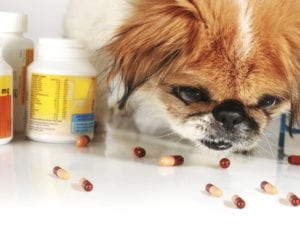 Cold and flu season is settling in, and while we hope that your family is staying healthy, don’t forget to think about your family pets and the impact your illness may have on them. Oftentimes, while we are fighting off a sickness, we are taking cold and flu medications to help us do so. Many of these cold-type medicines contain multiple ingredients, several of which can be incredibly dangerous to our pets.
Cold and flu season is settling in, and while we hope that your family is staying healthy, don’t forget to think about your family pets and the impact your illness may have on them. Oftentimes, while we are fighting off a sickness, we are taking cold and flu medications to help us do so. Many of these cold-type medicines contain multiple ingredients, several of which can be incredibly dangerous to our pets.
The trick is what to know and what to watch out for when it comes to cold medications and pets:
Acetaminophen
Acetaminophen, more commonly known as Tylenol, is a very helpful medication for sick humans. Unfortunately, pets – especially cats – can suffer serious consequences if they ingest it. Acetaminophen toxicosis in pets can cause liver failure.
In cats, the dire consequences result from their inability to process acetaminophen so that it may be excreted from their body. This results in a higher likelihood of liver damage and an impairment of oxygen delivery to the body.
Ibuprofen/Naproxen
Non-steroidal anti-inflammatory drugs such as those found in Advil or Aleve are also a serious risk to pets. Many cold and flu or sinus medications contain these ingredients to help relieve inflammation in people.
NSAID ingestion may cause:
Phenylephrine/Pseudoephedrine
Phenylephrine or pseudoephedrine are commonly used decongestants. They may be found in medications such as Sudafed or in combination medications like Mucinex-D. They may also be found in antihistamine medications such as Claritin-D or Allegra-D.
Ingestion of these decongestants by pets may lead to:
Phenylephrine is a little more forgiving than its cousin pseudoephedrine, but can cause problems at high enough doses as well.
Dextromethorphan
Dextromethorphan is an opiod medication that is commonly found in anti-cough medications such as Robitussin-D and many other cold medications.
At lower doses it may cause vomiting and lethargy in pets. At much higher doses pets can experience agitation, increased heart rate, tremors, and seizures.
Do your best to prevent accidental pet poisonings by never giving any medications to your pet without direction from a veterinarian. It is also important to keep your medications out of reach and behind a closed door. Medications on the counter, table, or nightstand may be tempting for pets.
Don’t forget child-proof caps are not necessarily pet-proof. Pick up any dropped pills promptly and be sure to keep your pet’s medications in a separate location from your own to prevent accidents.
If you think your pet may have ingested a potentially harmful medication, do not delay and give us a call to find out what to do next. You can also call a pet poison helpline such as the ASPCA Animal Poison Control Center at (888) 426-4435. A charge often applies when calling these hotlines but their expert staff can give you valuable information to help your pet. Regardless, do not delay when seeking assistance for an accidental medication ingestion. Time is often crucial to prevent serious problems.
Recent Posts
About Us
We know that choosing the right veterinarian for your pet (and you) can be a challenge. Yet, with our stress-free handling, our long-term, experienced staff, and a state-of-the-art facility, we make the decision an easy one!
